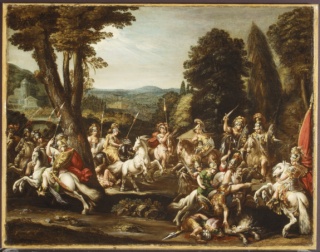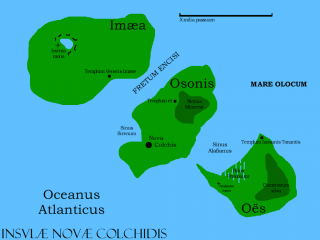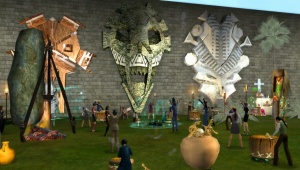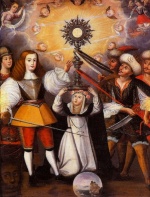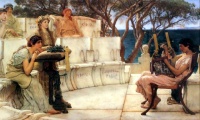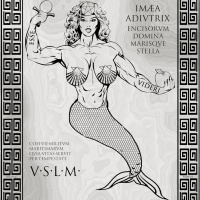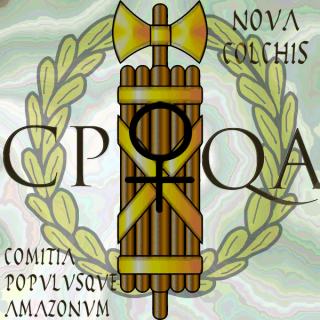New Colchis
New Colchis is an archipelago of three main islands and a number of smaller islands that lies well to the south of the Rogue Isles along the Mid-Atlantic Ridge. The islands are volcanic and the climate is subtropical. They are shielded from discovery by outsiders by a mist that obscures vision if sailors who do not know the way attempt to visit them. The origin of the mist is unknown but is likely supernatural. The island is named after the Greek settlement of Colchis.
New Colchis is now home to an Amazon society of women warriors and gladiators whose lives are patterned after life in the ancient Roman Republic.
Contents
Geography
The three main islands are named Oës, Osonis, and Imæa, after the Three Mermaid Goddesses (below).
Imæa, the largest of the three islands, is a dormant shield volcano, covered mostly with volcanic savannahs and subtropical forests. Hunting, viniculture, and agriculture here feed the islanders. The volcano houses caves that lead to the Underworld.
Osonis, second largest of the islands, contains a large natural harbor. On it stands New Colchis, capitol of the Republic. New Colchis is a small city built of basalt rock and palm logs in a distinctive style, somewhat primitive, but seeking to imitate the features of classical Roman architecture.
Oës is the oldest of the islands geologically. It is the most geographically diverse of the islands, with eroded rocky prominences, dense forests, and open plains. It is used chiefly as a training ground for military exercises.
History
According to the founding legends, which may be believed or disbelieved at will, the Emperor Diocletian had thirty-three spirited daughters. Their independence was jarring to patrician Roman society, and Diocletian arranged marriages for each of them in order to compel them to conform. The women chafed at this, and at the instigation of the eldest of them, Julia Victrix, each of the daughters of Diocletian murdered their husbands on a prearranged night.
These murders shocked the Emperor, but he was loath to simply have his daughters put to death, so he had them set adrift in the Atlantic Ocean in a ship. There, they prayed to the Goddess Minerva, who steered them to the islands of New Colchis, which they named after classical Colchis, legendary home of the Amazons and the sorceress Medea. Here, they devoted themselves to the cultivation of military discipline in order to preserve their independence.
Culture
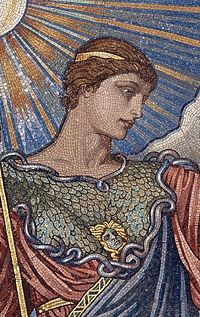
Demographics
The permanent population of the island is exclusively composed of women, and numbers around 7,500. The islands are the last place on earth where silphium and moly grow. Alchemists on the island brew an elixir from silphium and moly that gives the residents of the island unusually long lives and physical vigor. The average lifespan is approximately 500 years. As a result of the effects of this elixir, and also as a result of the life long physical training and military discipline undergone by natives of New Colchis, all women from the island tend to be larger and stronger than the human average elsewhere, and even if physical strength is not the chief discipline they cultivate.
The founding Mediterranean population, since the original settlement of the islands, was augmented by the rescue of a number of slave ships that were raided or shipwrecked during the period of the Atlantic slave trade. The female cargo of these ships were recruited into the population and trained. Men were administered the Waters of Oblivion and repatriated or allowed to remain until they died.
Men are only allowed on the island temporarily, and are not exposed to silphium or moly. Shipwrecks occasionally toss them up, and others were formerly brought there by raids, until an informal relationship with Paragon City was formed. Any men are housed on a compound on Oës. Men washed ashore there often choose to stay, and perish of exhaustion after several years. Those who leave are made to drink of the waters of oblivion. Because of the longevity enjoyed by the female population, few children are currently needed to maintain a sustainable population. By grace of the goddesses, all children born on the island are female.
The language spoken in the islands is a variety of spoken Late Latin. The literary and formal standard continues Classical norms. Greek is also known, as are a number of West African languages (Yoruba and Kikongo). English has recently become known there.
Religion
Classical continuity
The religion practiced in New Colchis is a female-centric version of the Roman religion, but with many innovations. Minerva is the de facto head of the pantheon there. Venus, Juno, and Vesta are also worshipped, as are Vulcan and Neptune. The private, personal worship of the junones loci is almost as important as the public cult of the gods. Animal sacrifice is the chief act of public worship. Major festivals include:
- Carmentalia (mid-January, during which auguries of the new year are taken);
- Lupercalia (mid February);
- Ludi Megalenses (early April) athletic games in honor of Mother Earth;
- Lemuria (mid-May), devoted to the ancestral cult;
- Vestalia (mid-June), for Vesta;
- Vinalia (mid-August), in honor of Venus and hopes for a good harvest;
- Equus October (October Horse, sacrificed to Minerva and Mars);
- Saturnalia (a festive week nominally devoted to Saturn). which concludes with;
- Larentalia, in honor of Diana and Juno.
Olocunæ
In addition to the classical pantheon, the women of New Colchis worship a maritime version of the Triple Goddess, the Sirenes Tres, envisioned as sirens or mermaids. These goddesses are individually known as Osonis Æamia, the maiden and patroness of love, and identified with Venus; Imæa Immania, the mother and patroness of fertility, identified with Juno or Ceres; and Oës Iansanis, the crone and patroness of war, identified with Minerva and Proserpina. Collectively, these three mermaid goddesses are known as the Parcæ (Fates) or Olocunæ.
New Colchis has public temples of Minerva, Vesta, and the Olocunæ. The temple of the Olocunæ is more of a courtyard. It serves as a public meeting and concert hall, since the chief act of worship performed in their honor is frenzied dancing and drumming. Others have smaller or private shrines.
Innovations
The Encisi are also venerated there; these are the souls of the honoured dead, identified with the Penates. These spirits are also called sanctæ ('holy ones') or auriciæ ('the hearers?' o.o.o.). Communion is also sought with these spirits at ceremonies in their honor. The Latin name Encisi is usually explained as 'those whose names are inscribed'; there are other explanations. Animal sacrifice is also offered to these spirits. Their oracles are a form of geomantic divination, consulted with nuts or shells, which are used to generate figures similar to the I Ching. Divination determines which of the Encisi should be worshipped as an individual Amazon's patroness. Divination also decides when these spirits demand sacrifices, and of what.
A few Classical figures are venerated as Encisi; not the Olympian gods, but founder figures and culture heroines like Medea, Penthesilea, and Camilla, the Ultrices ('avengers'). These spirits are also the easy path for an outsider to achieve divinity on New Colchis. A wide variety of historical figures are worshipped as Encisi. These include predictable ones like Hypatia and Joan of Arc; they also include Benjamin Franklin, Uncle Tom (from Uncle Tom's Cabin), and Amelia Earhart. Probably the most widely venerated male deity on New Colchis, far more conspicuous than any of the Roman gods, is the ghost of Charles II of Spain, who is considered a healing spirit and wise counselor on New Colchis. He gets a public feast at the end of July.
Christianity is at least known in the islands, but their understanding of its teachings is rudimentary at best. It is not held in high regard. The Latin Bible is known, but is generally mocked for what is considered its subliterary character. The chief influence of Christianity on the island is from the Roman Catholic cult of the saints. Popular opinion holds that Christianity involves the worship of the dead, and as such it is considered analogous to the worship of the Encisi. St. Barbara has some popularity as an Encisi; she is identified with Oës; Saint Catherine is identified with Osonis and sometimes confused with Hypatia, while the Virgin Mary is identified with Imæa or Isis, and is typically pictured as a mermaid, with the joke ex hoc virgo 'that's why she's a virgin'.
Religion and politics
The traditional Roman religion, being of course polytheistic, was always at least somewhat welcoming to new gods and new forms of worship. As always, though, there are those who prefer the old ways versus those who embrace change.
As such the religion(s) practised on New Colchis consist of two complementary but sometimes competing belief systems. These belief systems conform roughly to the two major political factions of New Colchis. There is a traditionalist faction, the optimates, led by Heraclea, that insists on the primacy of the Roman goddesses. There is an innovating faction, the novitantes, led by Grandma Gnosis and Catrina Calaveras, that at least prefers the worship of the Encisi. Worship of the Sirenes Tres is the chief point of agreement between the two factions. Generally the optimates view the novitantes as unseemly; their worship lacks the gravitas they consider to be a founding Roman value. By contrast, the novitantes view the optimates as scolds and stick-in-the-muds at best, as underhanded defenders of entrenched power and interests at worst.
Politics
The women of New Colchis chose to found a republic rather than a monarchy. Executive power is wielded by two Consuls, in connection with the Comitia Centuriata, the legislative assembly. The two consuls serve two year terms, and one is replaced yearly, so the two terms are staggered. A consul may not serve successive terms, but the same woman may be made consul more than once. Years in the public calendar are reckoned by consulships: i.e. the year of the founding of New Colchis is Julia Victrice primum Alba Altaque consulibus - "when Julia Victrix for the first time, and Alba Alta, were the consuls". As opposed to the calendar year, the annus consularis or consular year runs from March to March. This marks the terms of office of each consul.
A military legislature
In addition to the Consuls, the chief leader of the armed forces of New Colchis is a Polemarch. She commands the six Centuries into which the armed forces (i.e. the entire population) of New Colchis are divided: the infantry, the engineers/artillery, the cavalry, the navy, the archers, and the intelligence/clandestine service. Voting for the Comitia Centuriata is representative by branch of service, rather than by a vote of the entire population, and each branch of service sends five representatives, all of whom hold the title of tribuna militum, 'tribune of the soldiers'. Ties among the voting of the six services are broken by the Polemarch, who in turn is selected by agreement of the two Consuls. In times of peace the Consuls' authority is paramount, but in times of war the Polemarch wields supreme authority.
The cursus honorum
The business of politics is considered the highest calling of every Amazon, and the holding of offices is the main form of celebrity. There was a set of expectations for any Amazon who wanted a public career. You began, after what was hopefully a successful military career, with the office of:
- Tribuna militum or tribuna comitialis, or comitial tribune, representing one of the six military branches in the Comitia Centuriata. From here you can progress to the office of:
- Quæstrix, the 'quaestor', administering finances; thence to
- Ædilis, 'aedile', in charge of temples, building projects, and public works; thence to
- Prætrix a 'praetor', judging legal cases. The last step, achieved by the fewest Amazons, is election as a
- Consul.
The persons of each of these officeholders is sacrosanct. Violating their sanctity is the highest form of political offense and is severely punished.
Bad or controversial decisions while holding any of these public offices can stymie your career and result in failure to progress to the next level; but any Amazon holding any of them will have accumulated enough wealth and connections to retire comfortably. So there are elements of a meritocracy to the system, but also elements of a popularity contest. Officeholders seek to curry favor with the general populace by sponsoring public feasts or spectacular gladiatorial games. Popular acclaim generated by these means will be noticed and sponsors for the next office will start lining up in the Comitia.
Culture
Military exercise, athletics, and gladiatorial combat are the chief sports and entertainments of the population. Most aspects of life are governed by a spirit of fierce competitiveness, a struggle for dominance. Women are seen as the obvious superiors to men; one aspect of this traditional wisdom is expressed in a New Colchian proverb: viri molles et vim carent. ("Men are squishy, and lack stamina.") Track and field sports are also widely practiced. A variation of dodgeball, played with shotputs, is widely enjoyed both as a participatory and a spectator sport; this is the national game.
In addition to athletic and combat games, sculpture, music, and poetry inspired by classical models are practiced. Poetry is largely derivative of Greek and Latin models. The chief musical tradition on the islands revolves around drumming; three or four woman drum ensembles work a variety of skin and log drums, usually played with bare hands. Vocal and instrumental improvisation over a set of traditional rhythmic figures repeated below, called claves sonatæ, is the basis of this art. Several of the claves are sacred, devoted to particular goddesses and patroness spirits.
Foreign relations
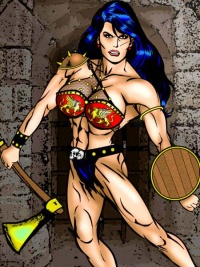
Strictly speaking, New Colchis is an isolationist republic without foreign relations.
Paragon City was discovered in New Colchis during the Rikti War. An attempted Rikti landing outside New Colchis was repelled fairly handily, but this brought with it the intelligence that the people of Paragon City possessed unknown technologies.
An initial landing by an expeditionary force was made along the Adams River in approximately 2003. This did not go well: the first Paragonians encountered in numbers by the expeditionary force were large numbers of lightly armed Skulls, giving rise to a contemporary catchphrase in New Colchis: Vadite. Venamini. Calvarias trucidate! ("Go. Hunt. Kill Skulls.") It became evident to the would be conquistadoras that they were dealing with a large territory whose immediate conquest and occupation presented logistical challenges that were currently beyond them.
No official contacts were made with Paragon City, but one of the Skulls who escaped them managed to get word of the existence of New Colchis to the Circle of Thorns. High ranking members of the cult were intrigued, and managed to get onto the island by their spells. Here, they stole the Jewel of Hera. Heraclea, the first citizen of New Colchis to be sent to Paragon City and who registered as a hero there, was a gladiator who was sent on a mission to retrieve it from the mages.
The Troll Cure
Official relations between Paragon City officials and the amazons of New Colchis have been placed on a more secure footing since the discovery of the Troll Cure.
Trolls, of course, are former citizens who turn into trolls due to their abuse of Superadine. Early on in her career, after Heraclea captured an Ogre, she chose to toy with him for a while before turning him over to the Zig. While Superadine gave the Troll endurance and strength beyond ordinary human capacity, this was not limitless, and repeated acts of exertion were able to burn off some of the Superadine in the Troll's system.
After the discovery of the Lost Cure, heroes from New Colchis conducted experiments on Trolls. They discovered that by repeatingly taxing the Trolls' constitution, they were able to tap out the remaining Superadine in their systems and restore them to some semblance of normality. The discovery of the Troll Cure persuaded Paragon City officials to cautiously release small numbers of Trolls into the custody of New Colchis amazons for the purpose of being cured.
The arrival of a handful of Trolls in custody on New Colchis pretty much confirmed their opinion of men - superficially strong but lacking in stamina, brutish, and dumb as a sack of hair. The details of the cure are a closely guarded secret. Heraclea has only said that it involves "wrestling the troll into submission and the application of pressure to sensitive points, to make the Troll overexert himself." She insists that only amazons could actually administer it. (Heraclea offered to show how the cure was performed to Doc Delilah, who was entirely uninterested.) Crey physicians who examined former Trolls reported a number of minor soft tissue injuries, but nothing that seemed permanently harmful. After undergoing the cure, the Trolls are administered the Waters of Oblivion, so they do not recall the details themselves.
The current situation
The discovery of the Troll Cure laid a foundation for peaceful co-existence between New Colchis and Paragon City. The Troll Cure means also that New Colchis no longer needs to raid shipping to meet its admittedly small need for human males. New Colchis also offers to train female heroes in its traditional martial disciplines.
Closer ties with Paragon City have induced a small amount of wanderlust and unrest in some elements of the population, though: especially those who sought but have not been admitted to Troll Cure training. A number of unauthorized New Colchis amazons have taken off on their own, and some of this chaotic element have ended up in the Rogue Isles.
The return of the Amazons
The Amazons have more recently returned to Paragon City, and have a new heroic supergroup, the Amazon Army, and its base the High Hypostylate.
Roster
The following are heroes who hail from New Colchis:
- Heraclea (Victory), tanker
- Toxotes (Victory), blaster
- Melaena (Victory), tanker
- Androphonissa (Victory), tanker
- Yansan (Victory), tanker
- Omphale (Victory), tanker
- Belphoebe (Victory), scrapper
- Wolf Witch (Victory), controller
- Mayahuel (Victory), blaster
- Camilla (Virtue), tanker
- Egeria (Champion), tanker
- Philippa (Champion), tanker
- Lampito (Champion), scrapper
- Ekphobippe (Champion), tanker
The following are rogue New Colchis amazons:
- Beata Beatrix (Victory), brute
- Anactoria (Victory), brute
- Ranavalona (Victory), brute
- Giulia Tofana (Victory), stalker
These heroines received training on New Colchis:
- Grandma Gnosis (Victory), controller
- Baroness Munchhausen (Victory), scrapper
- Damage Cushion (Champion), tanker
Associated supergroups:
